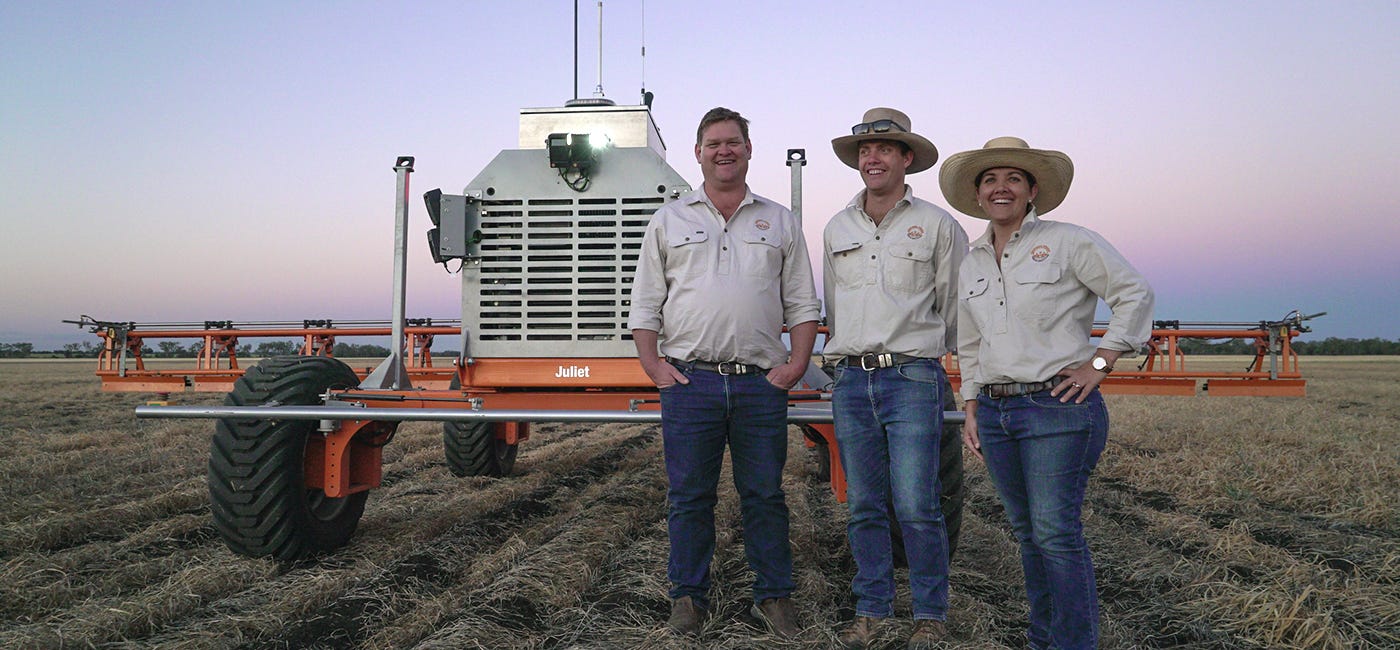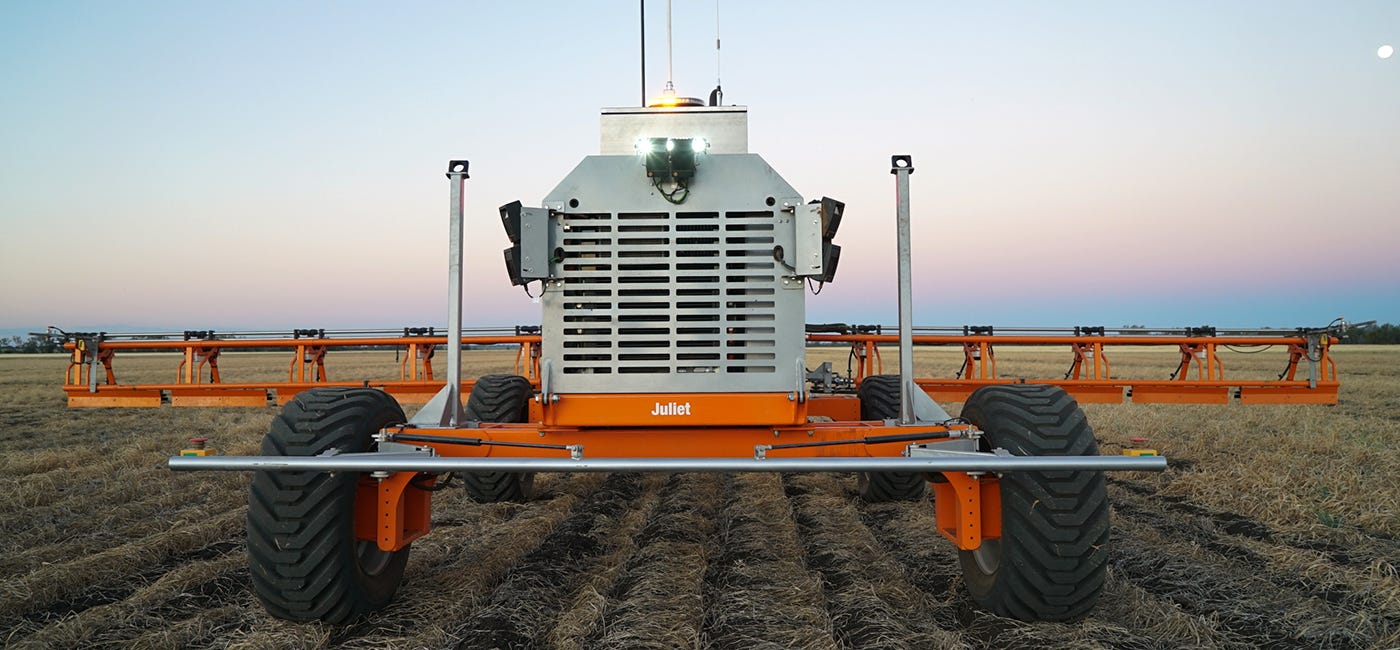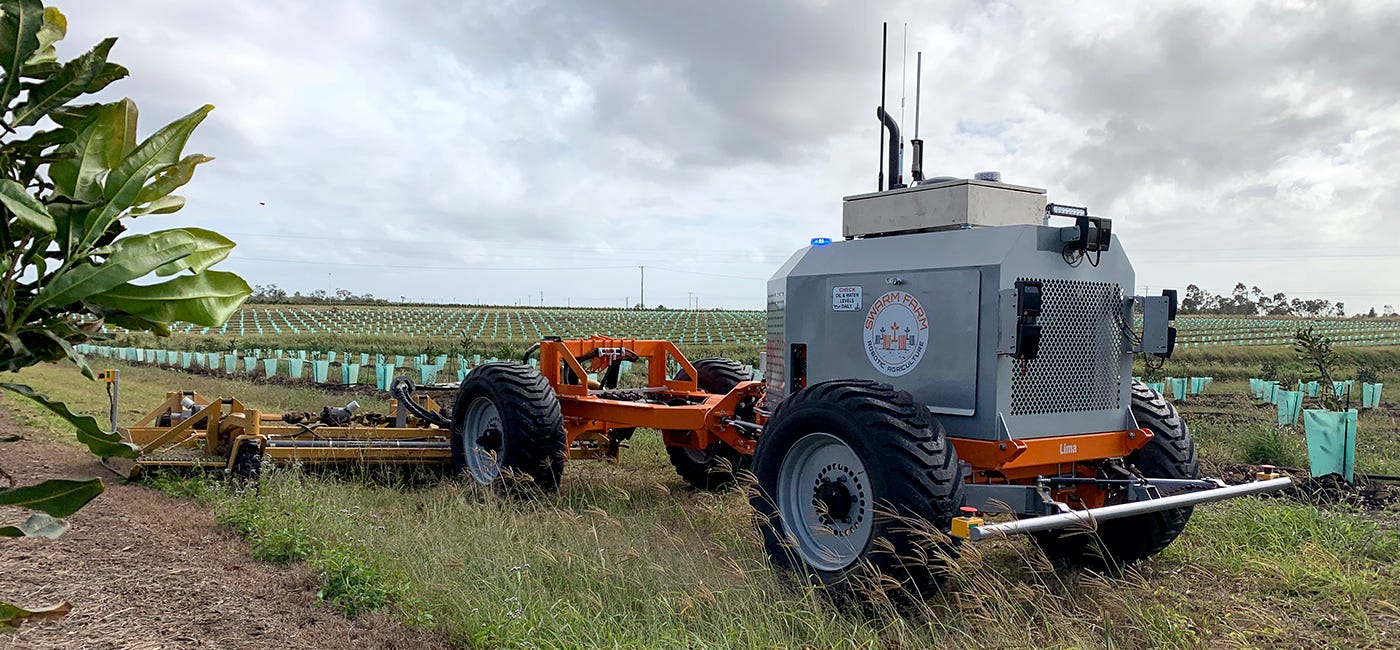Ag Tech Sunday - Regional entrepreneur reinventing Agriculture with robotic innovation
- By: "Farm Tender" News
- Ag Company News
- Dec 14, 2019
- 936 views
- Share

This article is bought to you by Stocka
The agricultural industry is not only one of the world’s oldest industries but arguably, one of its most important. This cornerstone sector of society plays a vital role, contributing to the social, economic and environmental sustainability of the world around us.
From feeding the masses with safe and nutritious food, to providing materials for clothing, warmth and healthcare, to protecting the environment and creating jobs in remote and rural communities, agriculture is helping make the world a better place to live.
So, how is this traditional sector continuing to meet the growing demand of an ever-growing global population, in the face of continual climate variability and while addressing challenges unique to our region? Agtech.
Innovation and technology is harvesting new ways of thinking, helping to modernise the agricultural sector and driving more sustainable practices — making farming more productive, more efficient and more environmentally friendly.
According to the report Accelerating Precision Agriculture to Decision Agriculture the implementation of Agtech solutions — and more specifically, digital solutions — has the potential to lift the gross value of the Australian agricultural industry by $20.3 billion, a 25% increase on 2014–15 levels.
Located on the outskirts of Emerald, in the small rural town of Gindie, SwarmFarm Robotics are one Queensland business embracing the opportunities innovation and technology is creating for everyday farmers with their agricultural robots used on orchards and grain, cotton and turf farms.

The SwarmFarm Robotics team (L-R) CEO and Co-founder Andrew Bate, Field Operations Lead Tom Holcombe and CFO and Co-Founder Jocie Bate (Courtesy of SwarmFarm Robotics).
Having spent decades adopting best practice agricultural techniques, SwarmFarm Robotics CEO, Andrew Bate became acutely aware of the limitations of traditional farming practices and set out to create farming systems that would improve modern-day farming.
“I have spent 20 years as a successful farmer in Central Queensland, adopting best practices with all aspects of our farming operation. As I started taking a closer look at everything we do, I realised, it was limited to what we could hook to the back of a tractor, or what we could tip into a spray tank and spray onto our crop — if it didn’t fit into either of these two paradigms, we weren’t doing it out in our crops,” Mr Bate said.
“So, I decided to examine agriculture and the productivity gains over the last 30 years and noticed two major driving forces that needed addressing. One was the answer in a can approach, whereby farmers have a complete reliance on pesticides, herbicides, fungicides and insecticides.
“Modern farming is written around the promise of an answer in a can, you tip something in a spray tank, you spray it on your crop and it solves your problem. In fact modern agriculture is so heavily based, and so heavily reliant on these pesticide solutions, that without them, agriculture stalls and actually goes backward in terms of productivity.
Ad - Want payment protection when selling Livestock, Grain or Hay? Click here to talk to Stocka - Ad
“The challenge here, however, is two-fold. Firstly, due to excessive use, many of the weeds, pests and diseases we deal with in agriculture have become resistant to the pesticides that we use — so they are no longer effective. Secondly, as society is becoming more focused on sustainability, consumers are demanding less chemicals used in their food and environment.
“The second trend we identified was machines getting bigger and heavier as farmers tried to get more efficient — putting large machines in paddocks, meant farmers could save on labour cost and farm more acres per day, per person.
“The issue with this, however, is that machines have become so big, heavy and cumbersome that they are no longer the best way to grow crops as they are creating massive amounts of soil compaction damage to our farming soils.”
By identifying these challenges SwarmFarm Robotics set out to create new farming systems that would not only support productivity but address the social trends of sustainability.
“While we never set out to automate agriculture, robotics was an opportunity to change all of this and actually bring new and advanced farming techniques into the hands of farmers. Using robotic technology, we could reduce the weight of machines and actually make them better for the soil, increasing crop yields. It also opened up all sorts of new farming methods and techniques that would allow us to cut pesticide usage and grow more sustainable crops.”
In 2012, using their own farming operations in Central Queensland as a testbed for Agtech solutions, SwarmFarm Robotics partnered with two universities to develop their first autonomous RTV prototype, the Agbot 1.
Two years later, they had built their first SwarmBot — a three wheeled, single drive machine that weighed only 300kg. This robotic solution challenged the current paradigm for large, cumbersome machinery — and farmers were starting to pay attention.
“In 2015, we delivered SwarmBot 3, attracting early adopter customers to use the robotics in a commercial spraying application and; by 2016 we were welcoming more than 400 people onto our farm for the early release of the first generation of our technology,” Mr Bate said.
In the following three years, SwarmFarm Robotics had developed 11 prototypes that were used in their field contracting service, to spray weeds for grain and cotton farmers, they had also developed a turf mower attachment to be fitted to a Swarmbot platform.

‘Juliet’ is one of SwarmFarm Robotics’ innovations. (Courtesy of SwarmFarm Robotics).
By 2018, SwarmFarm Robotics had made their first commercial delivery with a robot they named Indigo. Indigo was the first of the SwarmBot 5 platforms to be delivered and is now working on a turf farm, fitted with a 3m mowing deck.
In a whirlwind of mounting success, SwarmFarm Robotics was recognised as the 2018 Australian Agripreneur of the year at the Future Agro Challenge — a win that took them to the world finals in Greece in September 2019, where they were placed third out of 2,500 global AgTech companies in the world finals of the Global Agripreneur of the year.
According to Andrew, SwarmFarm Robotics’ success is attributed to balancing their clear innovation vision to become global leaders without losing sight of their regional agricultural roots.
“We set up SwarmFarm to build a global company that could deliver our technology all over the world,” Mr Bate said.
“We want to revolutionise agriculture and not just in Australia, we want to see our technology being used on every acre, of every continent in the world. We want to see our technology revolutionise the way food is produced to make it more sustainable and to make farming more productive and more efficient.
“When we started, everyone said we need to be based in the capital city, but in case you haven’t noticed, there are no farmers in capital cities — all of our customers, all of our technology base, all the users for our product are all out in regional areas. Building a world-class AgTech business based in regional Australia was important to us and ultimately that is what has been key to our success.”
Ad - Want payment protection when selling Livestock, Grain or Hay? Click here to talk to Stocka - Ad
“We have experienced incredible success so far and our ability to maintain our regional focus and put farmers at the centre of our innovations is one of our greatest achievements.
“There are lots of prototypes and concepts vehicles out there, but unlike our competitors, we are now physically handing our farmers the keys to autonomous, driverless robots that work commercially in agriculture — there have been very few companies that have been able to achieve this and we are very proud that we have.”
Australia is home to approximately 85,681 farm businesses, 99 percent of which are Australian owned and operated. Our farmers produce almost 93 percent of the country’s daily domestic food supply with each farm producing enough food to feed 600 people — 150 locally and 450 overseas.
Here in Queensland, we are home to the largest area of agricultural land of any state and have the highest proportion of land area in Australia dedicated to agriculture. Each year, more than 30,550 Queensland agricultural businesses contribute more than $10 billion to the state’s economy.
As global demand for safe and sustainable agricultural products continues to increase, how do we ensure we stay competitive and profitable? According to Andrew the key to success is embracing innovation and technology.
“The future of farming relies on sustainability, efficiency and productivity gains across the industry. Succeeding in this cannot be based on traditional practices or by simply adapting to current farming technology,” Mr Bate said.
“We need an agricultural revolution. We need forward-thinking innovative solutions that can continue to advance the way we grow crops, uncover new field techniques and enable new patterns of farming techniques and production methods.”
“Australian farmers are very good at adapting and are enthusiastic in both the development, and adoption, of Agtech solutions. We have got big data. Robotics are coming of age right now. We have got big information systems. We have got artificial intelligence that can be applied to agriculture. We have got all the ingredients needed to become world leaders in Agtech.
“Embracing the opportunities innovation and technology creates for the agriculture sector will open new doors, it will keep us competitive and profitable in our ability to produce food more sustainably and feed the world without wrecking the planet.”

A SwarmFarm Robotics, Swarmbot. (Courtesy of SwarmFarm Robotics).
By introducing technology and embracing innovation, SwarmFarm Robotics have not only provided solutions to improve agricultural practices and outputs, but also provided more career opportunities in regional Queensland.
Since launching in 2012, every aspect of their business operations have remained regional from writing their software and developing their robots, to securing sales and promoting their innovations to global markets, to commercially delivering their technology to farmers.
This has seen them create 16 knowledge-based jobs that would be hard to come by in regional Queensland with traditional farming practices — and with the company currently in the process of a series A capital raise, SwarmFarm Robotics expect to double the size of their team in the very near future.
As far as Advance Queensland success stories go, SwarmFarm Robotics are a fine example of how government support for our startups and entrepreneurs can help create more opportunities for regional Queenslanders.
According to Andrew programs such as the Ignite Ideas Fund are critical for businesses that are ready to take their ideas and innovations to the next level.
Ad - Want payment protection when selling Livestock, Grain or Hay? Click here to talk to Stocka - Ad
“Government support is critical for early stage businesses, particularly in technology as there is obviously a big risk with the possibility for failure. The flip side of course is that there is also enormous opportunity to revolutionise industries, to create new jobs, new industries and new opportunities in our country,” Mr Bate said.
“In Australia, we are heavily reliant on primary industries: mining, agriculture and even tourism. For jobs of the future and in order to have more diversity of job opportunities and economic growth in our country, it is important the government supports new industries to get off the ground… because if we don’t, we are sort of stuck with traditional industries and not the advanced industries that are creating wealth and creating opportunities for other countries all around the world.”
“For us, being awarded Advance Queensland Ignite Ideas funding meant we were able to build confidence with our early adopters in terms of support and getting first sales to customers in different industries. We were able target the turf industry, the macadamia nut industry and also broad acre grain farms. That support was very helpful for us at our early stage.”
When asked what advice he would give to budding Queensland innovators and entrepreneurs starting out on their journey, Andrew had three top tips to share.
- The first thing is to just get out and do it. Success is made by the people that turn up and have a go. Not by those who talk about it. You are never going to know all the answers. You are never going to know what bends are in the road and in the journey — and until you embark on that journey, nothing happens. That is why my first tip is to get started.
- The next tip is to always have a plan B. There are huge amounts of risks and there is a huge amount of uncertainty in what you are doing. For myself, coming from a farming background has been an excellent background for being an entrepreneur, because we are so used to having changing plans, we are so used to having to deal with climate change, weather variability, frost, hail, dust, heat waves, prices changing, exchange rates changing, crop disease, all of these different things. People often say that farmers are risk takers, we are not — we are opportunity maximisers and I think the key to farming and to the entrepreneurial journey is having plan B in place.
- The third tip is to network a lot. If you already have a really good network, use it and support that network in return. The more people you meet, the bigger your network gets –and the more connections you make means you have access to more help and can also help other people, it goes both ways. Building those networks early has been very helpful for us.
Visit Advance Queensland to learn more about how you can be supported on your entrepreneurial journey.










Share Ag News Via